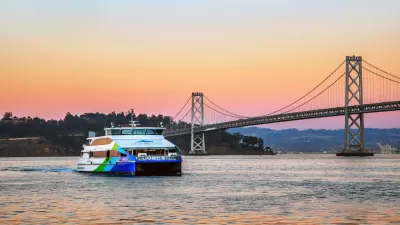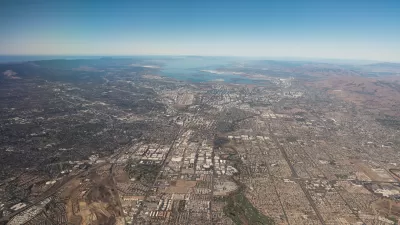You wouldn't be alone if you thought the tech industry had shifted its base of operations from the Silicon Valley to San Francisco. A new study of the tech industry's real estate footprint, however, reveals the South Bay's entrenched dominance.
Nathan Donato-Weinstein shares news of a new study by CBRE that "quantifies the Bay Area's tech footprint by industry subsector, revealing a number of interesting takeaways about site-selection trends, the state of the market and what risks might lie ahead for the regions' economies."
A key takeaway from the report: the commercial real estate market does not conform to the popular narrative about San Francisco emerging as a rival to the Silicon Valley's dominance as the geographic center of the tech industry. Donato-Weinstein explains:
While tech has certainly expanded in San Francisco ( hello, Salesforce Tower), the narrative may be overblown. In fact, the broader industry has continued to grow in its traditional South Bay stronghold. About 73 percent of all of the Bay Area's tech-occupied real estate is located in Silicon Valley, compared to 13 percent in San Francisco, 9 percent on the Peninsula and 5 percent in the East Bay.
Not only is the Silicon Valley home to the most tech companies, it leads the Bay Area in density of tech companies:
The report found that Silicon Valley remains the most dense tech market in the Bay Area, with 2,400 companies occupying 52 percent of the Valley's entire real estate footprint, or 126.4 million square feet of space. That compares to San Francisco's 1,800 tech companies occupying 22.4 million square feet of space, or 29 percent of all space. The Peninsula's 400 tech firms take up about 14.9 million square feet, also about 29 percent of the total office and R&D real estate. And Oakland's 700 tech firms occupy 8.6 million square feet, or 8 percent.
The article also considers some of the policies that are contributing to the Silicon Valley's dominance in the tech industry, relative to the rest of the Bay Area, along with more details from the study's findings.
FULL STORY: CBRE study quantifies tech's footprint around the Bay

Maui's Vacation Rental Debate Turns Ugly
Verbal attacks, misinformation campaigns and fistfights plague a high-stakes debate to convert thousands of vacation rentals into long-term housing.

Planetizen Federal Action Tracker
A weekly monitor of how Trump’s orders and actions are impacting planners and planning in America.

In Urban Planning, AI Prompting Could be the New Design Thinking
Creativity has long been key to great urban design. What if we see AI as our new creative partner?

Cal Fire Chatbot Fails to Answer Basic Questions
An AI chatbot designed to provide information about wildfires can’t answer questions about evacuation orders, among other problems.

What Happens if Trump Kills Section 8?
The Trump admin aims to slash federal rental aid by nearly half and shift distribution to states. Experts warn this could spike homelessness and destabilize communities nationwide.

Sean Duffy Targets Rainbow Crosswalks in Road Safety Efforts
Despite evidence that colorful crosswalks actually improve intersection safety — and the lack of almost any crosswalks at all on the nation’s most dangerous arterial roads — U.S. Transportation Secretary Duffy is calling on states to remove them.
Urban Design for Planners 1: Software Tools
This six-course series explores essential urban design concepts using open source software and equips planners with the tools they need to participate fully in the urban design process.
Planning for Universal Design
Learn the tools for implementing Universal Design in planning regulations.
Appalachian Highlands Housing Partners
Gallatin County Department of Planning & Community Development
Heyer Gruel & Associates PA
Mpact (founded as Rail~Volution)
City of Camden Redevelopment Agency
City of Astoria
City of Portland
City of Laramie





























